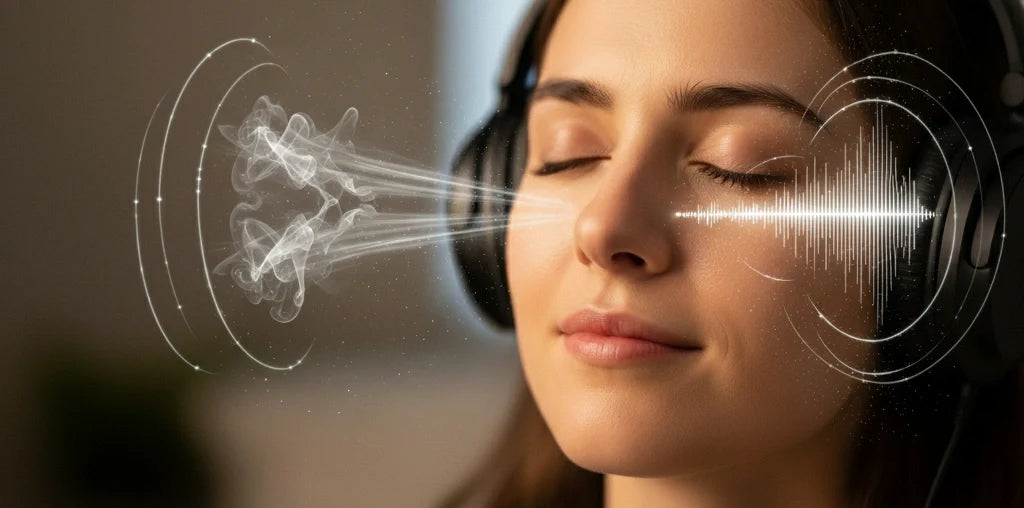
How Can ASMR Help With Stress, Anxiety and Sleep?
Share
In our always-connected world, finding natural ways to unwind has become more crucial than ever. One phenomenon that's captured millions of people's attention is Autonomous Sensory Meridian Response (ASMR) – those gentle tingles that cascade down your scalp when you hear specific sounds or witness particular visual triggers. But beyond the pleasant sensations, emerging research suggests ASMR might offer genuine benefits for managing stress, easing anxiety, and improving sleep quality.
The Science Behind the Sensation
ASMR describes the experience of tingling sensations in the crown of the head, in response to a range of audio-visual triggers such as whispering, tapping, and hand movements. While the phenomenon might seem purely subjective, recent scientific investigations have revealed measurable physiological changes that occur during ASMR experiences.
A landmark study published in PLOS ONE found that participants who experienced ASMR showed reduced heart rate (-3.41 beats per minute) and increased positive affect. Remarkably, these heart rate reductions are comparable to those observed in clinical trials using music-based stress reduction in cardiovascular disease, and greater than those observed in mindfulness interventions for anxiety.
The brain activity during ASMR experiences tells an equally compelling story. Functional magnetic resonance imaging studies have demonstrated activation in the middle frontal gyrus and nucleus accumbens during audiovisual ASMR stimulation, while auditory stimulation alone activated the insular cortex – regions associated with reward processing and emotional regulation.
Evidence-Based Benefits for Mental Wellbeing
Research consistently points to several key areas where ASMR may provide therapeutic benefits:
Stress Reduction and Relaxation
- Studies show that ASMR helped 98% of participants to relax, with 70% reporting it helped them cope with stress
- Participants who experienced ASMR became significantly more calm, less stressed and less sad compared to non-ASMR groups
- ASMR may slow the heart rate by as much as 3.41 beats per minute and promote a sense of calm
Anxiety Management
- A 2023 literature review concluded that ASMR can reduce stress and anxiety, with neuro-imaging revealing that ASMR activates brain circuits linked to stress relief and relaxation
- ASMR offers a unique way to unwind, helping shift your mind away from the fight-or-flight response and reducing feelings of anxiety
- Large-scale studies with over 1,000 participants found significant mood improvements and reduced arousal in people with and without clinical symptoms
Mood Enhancement
- Research indicates that 80% of participants reported ASMR positively affected their mood
- The soothing experience stimulates feel-good chemicals like dopamine and can help people feel less distressed and more fulfilled
- Studies specifically show decreased feelings of depression after watching ASMR videos in individuals who experience the tingles
Sleep Quality Improvements
Perhaps nowhere is ASMR's potential more promising than in sleep enhancement. Research shows that 82% of ASMR users report it helps them sleep, with multiple studies backing up these anecdotal reports.
Sleep-Specific Benefits Include:
- A recent 2024 study on adolescents found significant correlations between ASMR intervention and both objective sleep duration and effective sleep quality
- Medical student research showed 73.3% of participants shifted to the "good" category for sleep quality after ASMR intervention, compared to 0% in the control group
- ASMR triggers feelings of pleasure and relaxation, increasing hormones such as dopamine and oxytocin, which prepare the body for deep, restorative sleep
- Research from 2023 shows that ASMR may induce the brain waves necessary for sleep while keeping a person relaxed and receptive to rest
Optimizing Your ASMR Experience
The quality of audio plays a crucial role in ASMR effectiveness. Since many of the most potent triggers are auditory – from gentle whispers to soft tapping sounds – having equipment that can capture these subtle nuances makes a significant difference. Quality earbuds that offer clear sound reproduction and comfortable extended wear can enhance the immersive experience that ASMR content creators work so carefully to craft.
Research emphasizes that personal preference significantly impacts ASMR effectiveness, so experimenting with different trigger types is essential. Common effective triggers include whispering, tapping, brushing sounds, and personal attention scenarios.
Important Considerations
While the research is encouraging, it's crucial to understand that ASMR isn't a universal solution. Studies show that only about 37% of participants felt tingling sensations when watching ASMR videos, while the remaining 63% did not. However, even those who don't experience the characteristic tingles may still benefit from the relaxing qualities of ASMR content.
Critical to remember: ASMR should not be considered a substitute for professional mental health treatment. Unlike therapies such as cognitive behavioral therapy, ASMR lacks a strong body of research supporting its use as a standalone treatment. Think of it as a complementary tool in your wellness toolkit rather than a primary intervention for serious mental health concerns.
The Bottom Line
The growing body of scientific evidence supports what millions of ASMR enthusiasts have long known intuitively – these experiences can genuinely promote relaxation, reduce stress, and improve sleep quality. While researchers continue investigating the underlying mechanisms, the physiological changes documented in studies suggest ASMR's benefits extend far beyond placebo effects.
Whether you're dealing with daily stress, seeking better sleep, or simply looking for a natural way to unwind, ASMR offers an accessible, cost-free approach worth exploring. As with any wellness practice, the key is finding what works for your individual needs and preferences.
